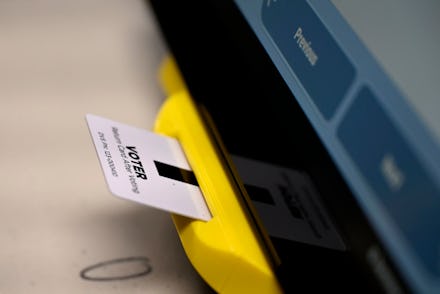Congress allots $425 million for election security, but experts say it's not enough

Congress has agreed to a compromise on funding for election security upgrades ahead of the 2020 elections. CNN reports $425 million will be allocated towards improving balloting systems across the country. House Democrats originally wanted $600 million, while Senate Majority Leader Mitch McConnell (R-Ky.) initially proposed $250 million.
The funds are part of a spending package intended to fund the federal government until September 2020, per NPR. The package has to be approved by the end of the week to avoid a government shutdown.
If the spending deal is approved, this will be the largest amount of money dedicated to the election system since 2016. Last year, Congress approved $380 million for the same purpose.
The funds are welcomed, but it is unlikely they will have any tangible effect on the upcoming presidential election given the quick turnaround. Another sore spot is the funding process follows the model of the Help America Vote Act, which was enacted in 2002, after the 2000 presidential election ended up at the Supreme Court. The law was a response to the problematic 2000 election — specifically the flawed paper ballots in Florida — and accelerated the adoption of paperless voting machines. Paperless machines make auditing difficult due to the lack of tangible records and were deemed outdated in 2016.
Sen. Mark Warner (D-Va.) is happy about the new funding, but he told CNN that he prefers a “permanent funding mechanism for securing and maintaining elections systems, and comprehensive legislation to protect our elections.”
Election security experts agree with the senator. Larry Norden, director of the Brennan Center’s Election Reform Program, called the deal a “Band-Aid.”
"At the end of the day, we need a Congress that's a full partner in election security, and that means consistent, steady funding. And I'd like to see at the very least some national guidelines around cybersecurity post-election audits, from Congress," Norden explained to CNN. "Unfortunately, that's a bridge too far for this current Congress. In the short term this is a good outcome, and more than a lot of people expected."
NPR spoke to Chris Krebs, who is in charge of the Cybersecurity and Infrastructure Security Agency at the Department of Homeland Security, and he echoed Norden’s sentiments. He considers the funding a “good start” but says it isn’t enough.
"The thing they want is consistency, something they can set their budget clocks to," Krebs said of state election boards. "If the federal government is going to play in this space, we have to be dependable partners."
Another sore spot is resistance from the GOP, according to Warner.
"While states are sorely in need of funds to modernize and secure election systems, what's substantially more important are setting minimum security baselines (including paper ballots) and establishing a mechanism of recurring — rather than haphazard — funding for continued IT upkeep and modernization," Warner said. "We've had bipartisan legislation to accomplish both of those things for over two years — but have been stymied at every turn by the White House and Republican leaders."